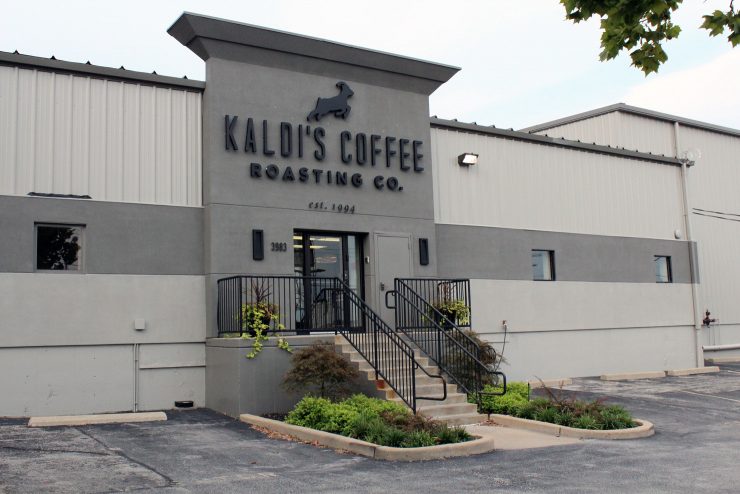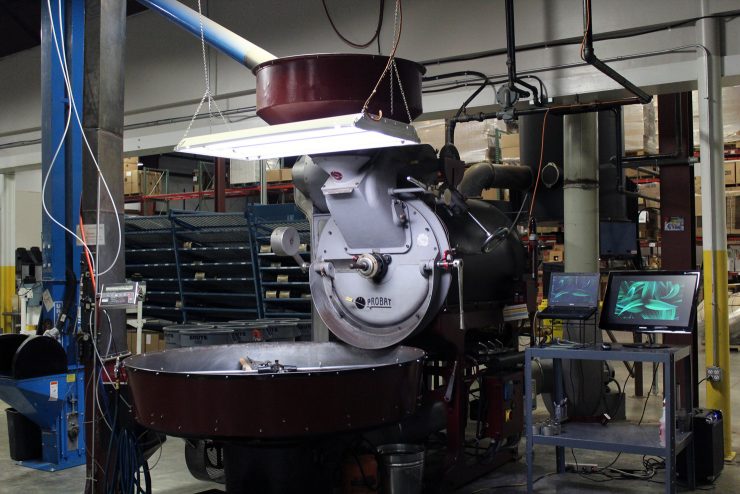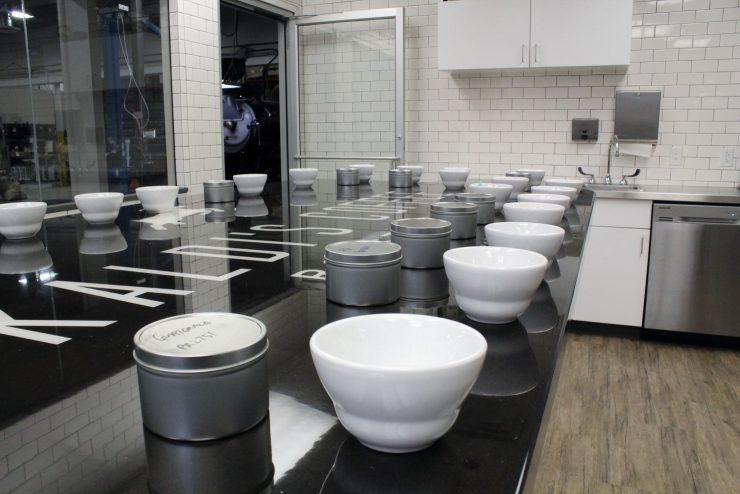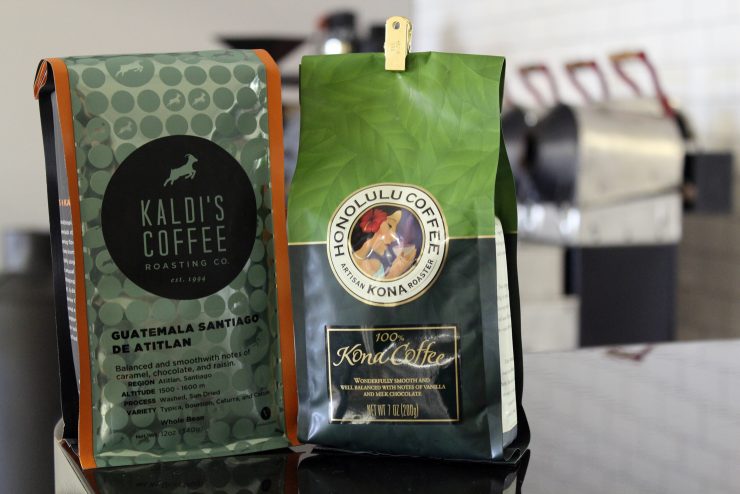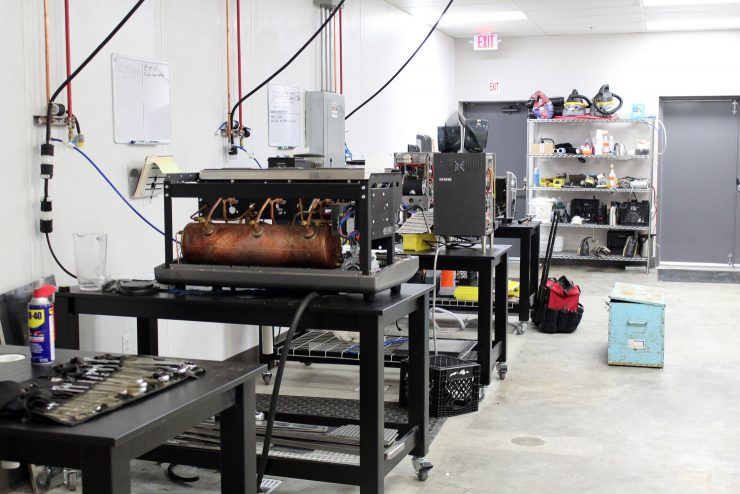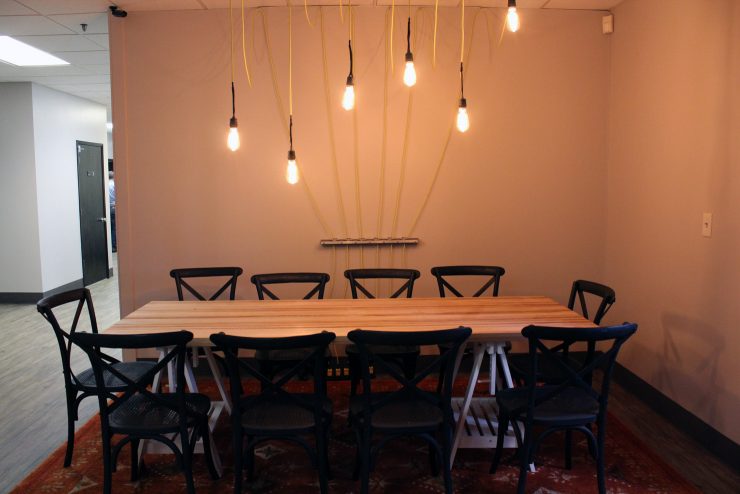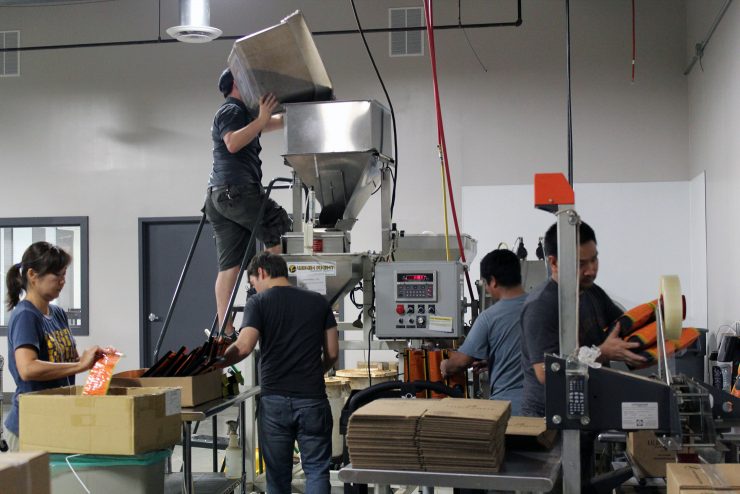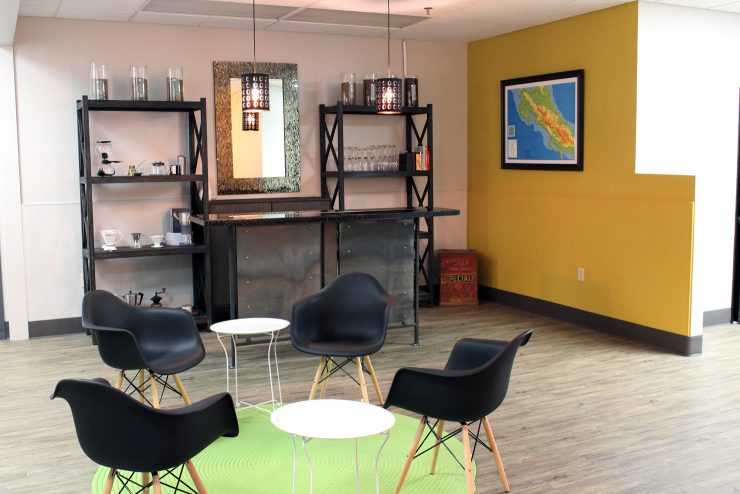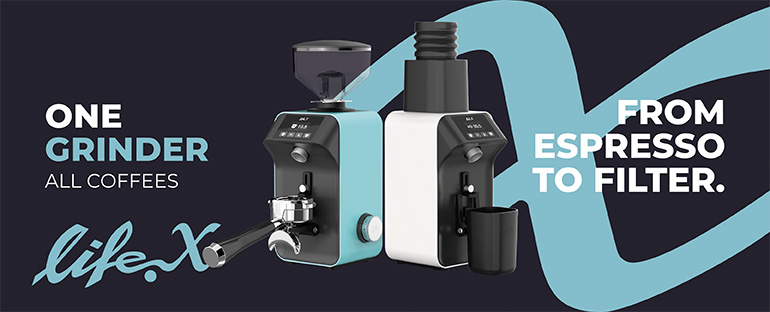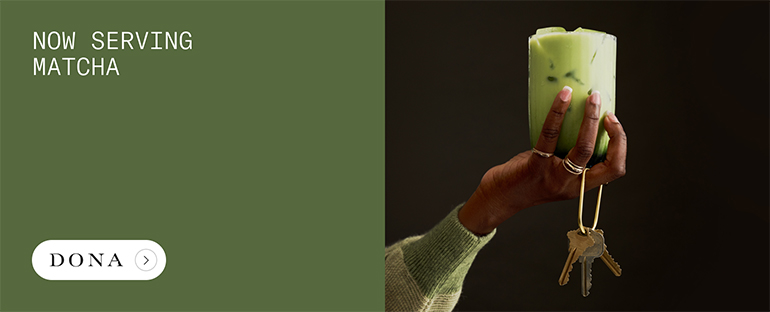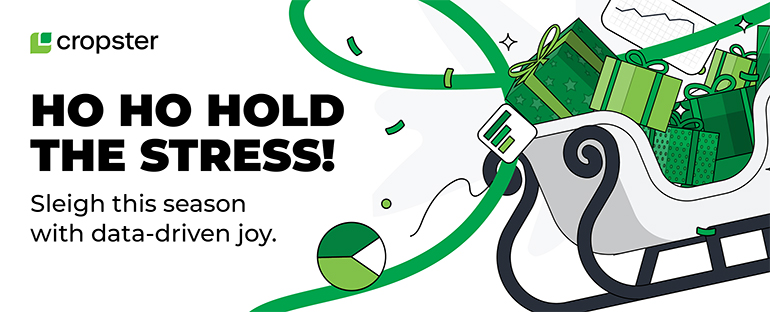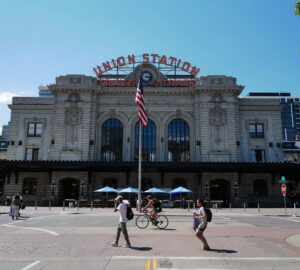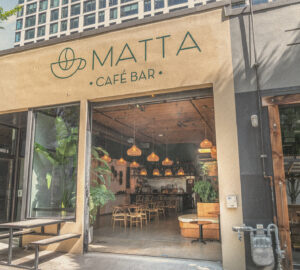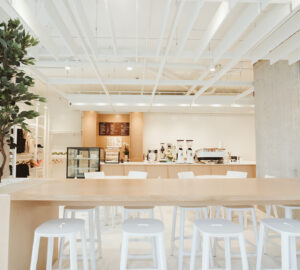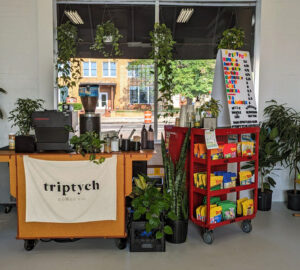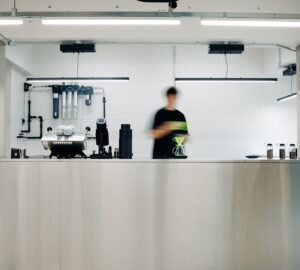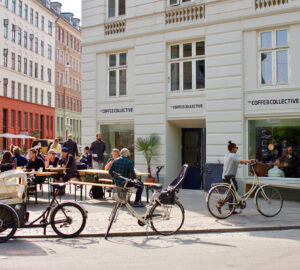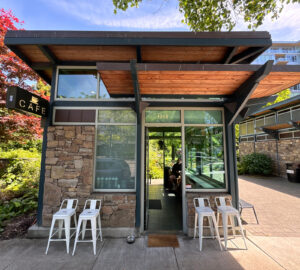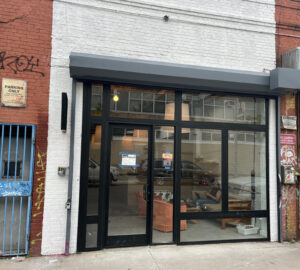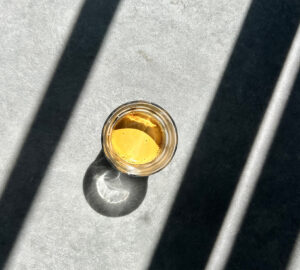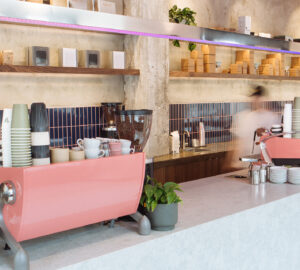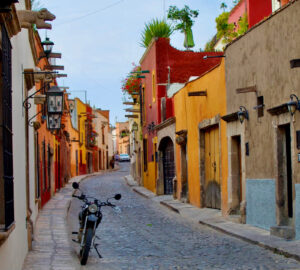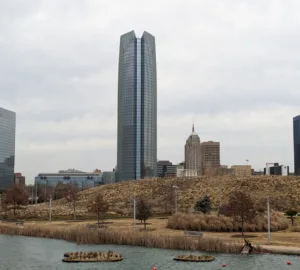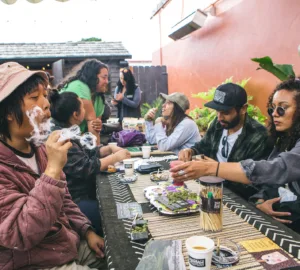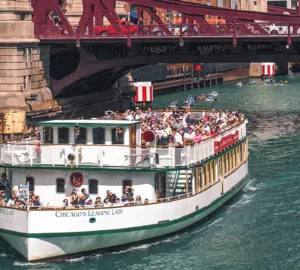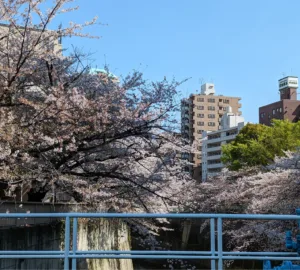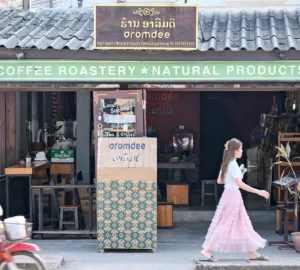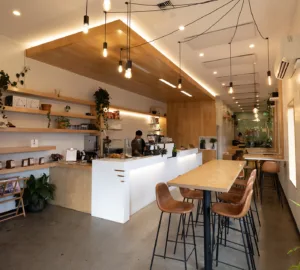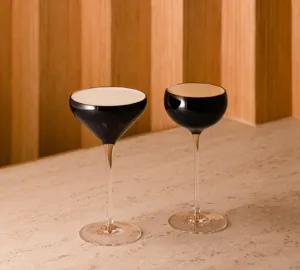It’s been a busy year for our friends & partners at Kaldi’s Coffee Roasting Company. The St. Louis business has moved into a brand new roasting facility (depicted in photographs throughout this article), which is an exciting time and a huge move for any company, although the actual distance of the move was quite small: the new Kaldi’s HQ is located next door to their original HQ space. They’ve also made several expansions with their roasting responsibilities while pursuing diversified business holdings in Hawaii, Japan, and the Southeast United States.
Sprudge St. Louis reporter Evan Jones sat down with Kaldi’s co-owner, director of coffee, and Specialty Coffee Association of America Taster’s Cup competitor Tyler Zimmer to talk about the company’s new roasting relationship with Palace Coffee, a new cafe now open in Atlanta, the subtle differences in doing business from Missouri to Japan, and what’s ahead for the twenty-year-old Missouri brand.
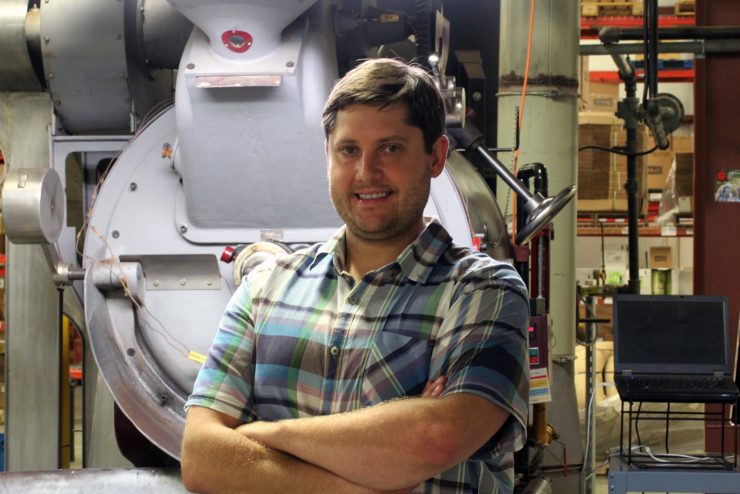
Congratulations on the new facility. What are you most excited about the new facility that the old facility did not have?
Efficiency, space, it’s newer. A lot of things for sure, just the ability to have better training spaces, more inventory, everything. The old building had a lot of charm but it was time to move.
What equipment are you roasting everything on?
We have a 1937 Probat G75. We have a 1950’s Probat UG22. We have a 1931 Probat Perfekt Five Kilo, which is a really neat, rare machine. And then a four-barrel Jabez Burns sample roaster.
Since we’re talking about roasting, how’s the roasting partnership with Amarillo, Texas’ Palace Coffee been going so far?
It’s good. We’ve known Patrick for a long time at Palace, just through industry stuff and competitions. We’d always catch up and you know they’ve been carrying our coffee off and on for the last year or so as a guest coffee. One thing led to another, just discussions, and what he was looking for and what could we help bring to the table as a wholesale partner of Palace. So, you know, just relationships with like-minded people, looking for similar things.
How long have you been roasting for them as of right now?
We started in July.
You also mentioned that you’re going to look and source microlots specifically for Palace. When is that gearing up?
Patrick’s actually coming here next week and we’re going to start putting together a lot of ideas for that. Andrew McCaslin, who worked at Palace for a couple of years, just moved here last month and is going to start roasting for Kaldi’s as well. So it’s an interesting link in the whole thing and it also helps Patrick keep another connection to Palace.
When can people expect the microlots?
I’d say, oh, in the next couple of months.
Kaldi’s recently opened up a shop on the Emory University campus in Atlanta. How was that build-out process?
It happened very quickly. We kind of found out about an opportunity at Emory in April/May [of 2015]. One thing led to another through a relationship that we had to open down there. We’ve been working on this since May being teamed together. Nick, one of our managers here from St. Louis, moved to Atlanta to help open and run that shop. We’ve been open two weeks, and school has just started there. It’s on campus, so it’s been a busy two weeks but they’ve had a lot of support from St. Louis down there. Right now, we’ve had three baristas from St. Louis down there just working with the team every day, training and all those kinds of things. It’s been exciting, it’s awesome.
Does the experience working with Washington University help you transition with opening the Emory University location?
Yeah, definitely. Just knowing how the universities work and through some food service sometimes, knowing your partners at that level…it’s been very beneficial. Wash-U and Emory are very similar-type universities and they expect quality, they want quality, so it’s been a good partnership.
Are you looking to explore more into the Southeast?
I’d say if you had asked me six months ago if Atlanta had been on our radar in the next three to four years…probably not, but that’s what’s exciting about this business and creating relationships and opportunities that have led to that. We are doing a joint venture in Nashville with a company called Frothy Monkey, and we actually just started roasting there this week for that project.
There are interests in St. Louis, Columbia MO, Kansas City, Nashville, and now Atlanta. The company also has international holdings with Honolulu Coffee and some stores in Japan. How do all those different pieces work together in one company?
Yeah, with Kaldi’s you have Kansas City, Columbia, St. Louis, and Atlanta, and that’s a Kaldi’s thing, and then we have a joint venture in Nashville where we work very, very closely with our partners there [at Frothy Monkey]. It’s a separate company there, but bringing our philosophy with coffee and just some knowledge and some know-how to help them get off the ground and bring that to Nashville as well.
Honolulu is interesting and it’s a business where we’re the majority owner of, we have about ten cafes in Hawaii that we own and operate. We’re getting ready to open what we call an “experience center” which is essentially a big cafe tour focused on Kona coffee and roasting. We’ll have a Probat UG22 there to show folks what we do. We consider that a sister company of ours; we’re the majority owner of that company. We have a partner, Ed Schultz, who lives in Hawaii and helps run the day-to-day. Then we signed a franchising agreement into Japan three years ago and have about 20 stores open in Tokyo, Yokohama, and around Japan over the last three years.
It’s been interesting, Honolulu is a very interesting, different market, and very much centered around tourism and Hawaiian coffee. About three years ago, we bought a 75-acre coffee farm in Kona and have roughly 50 acres planted and it’s been interesting. [We’ve] learned a lot about farming, [and] still are. Coffee’s an amazing product—it’s a very hard product—and you learn to appreciate it a little bit more once you learn the farming side even more.
Have you noticed any similarities or differences as to how the cafe approach is from a cafe in St. Louis to, say, Yokohama?
Yeah, definitely. In Japan, it’s definitely a different market, and they have different expectations. I would say they appreciate quality but I don’t think they’re quite at the level of what I would call Third Wave coffee that the US market is currently, but it’s changed rapidly in the last three years, too, with Blue Bottle opening and even a lot of other Japanese companies opening up. So when we opened our first store there I would say there weren’t many Third Wave shops and now it’s becoming quite more abundant.
When the Third Wave of coffee came through St. Louis, you made some changes to some of the stores locally. How has that transition been for the company?
It’s been good. I’d say it’s an evolution as much as anything. I think it’s different for sure for a company like Kaldi’s, that’s been around and has had their first cafe open for over 20 years now. I think that’s the important thing to remember, for everyone in coffee, is that it is such an evolution; we all didn’t wake up drinking espresso shots of a really good Grade 1 Sidamo or something like that. It’s an evolution, and we’re making sure we are bringing customers along. I think that’s a big part of what we try to be a part of every day but we want to continue to push to be at the forefront of coffee. That’s important for many reasons: sustainability, quality, all those things combined.
How did your relationship with Firepot Nomadic Teas start?
Over the last three or four years, we’ve been doing more business in Nashville with wholesale customers. Through that we met a really cool person, Sara Scarborough, and started talking to her. She’s had a couple different tea businesses over the last 20 years. She’s been working in tea for 15–20 years from New Zealand to Alaska, so it’s quite an interesting past and so we got to know her, and talk tea.
We’re into quality. We knew we wanted to do more tea-wise and she had a small wholesale chai company in Nashville called Firepot. She’s had Firepot probably off and on for the last 15 or 20 years where she would go make it at farmers’ markets and things like that. Between doing that she did sourcing for her own company, she did sourcing for Republic of Tea, so she had a lot of great experiences. She’s traveled the world, to many of the top tea gardens in the world, so one thing led to another. We kind of talked about how could we partner and maybe bring Firepot to a bigger audience and that’s what we’re working on doing right now.
After walking through the roasting facility, there’s definitely some additions that are being made. What are you looking to add to the space that isn’t here already?
Well, for Firepot specifically, that brand is its own entity but we’re also going to start bottling our own chai concentrate. So grinding all the fresh spices in house, sourcing them specifically for what they are, you know, for our own recipe for our chai. It’s been Sarah’s recipe for 15 years and we’ll tweak it here and there but it’ll be all fresh ingredient bottled chai, and we’re going to start bottling it in house.
How much green coffee is your facility able to hold?
Oh gosh, I really don’t know, it could probably hold a whole lot, but with coffee, it’s…we probably keep two or three weeks of inventory at a time. For us, if we can get our coffee stored in the Midwest and shipped more often, that works just as well for us. We might have 40,000 pounds out there right now, something like that.
What’s the pounds per week roasted coffee output of the facility?
Right now we do about 15,000 pounds per week.
Looking down the road with expanding into different markets, do you have specific areas that you’re looking to expand into, or are you pretty content with where you are right now?
I’d say right now we’re pretty content with Kansas City, Columbia, St. Louis, then Nashville and Atlanta. I don’t see Kaldi’s doing too much outside of those areas over the next year or so, we’re pretty much holding tight with what we’ve got and doing that. Honolulu, you know, same thing, Honolulu is in Hawaii and our main objective is there in Hawaii, and then supporting our partner in Japan. We’ve opened two new cafes in Hawaii recently, and you might see a few more new stores there someday, but nothing is in the works.
Are there any possible tie-ins kind of linking the different segments of your company? For example, is there anything that you’d want to do with the Hawaiian coffee side of the business holdings transitioning those into cafes in Nashville or Columbia?
Yeah, it’s definitely something that I think I’d want to do at some point. I really just want to get our processing done at the farm level, but I think it would be awesome around the holidays to do a really unique microlot just for the cafes, or sell it to a wholesale customer or whatever. I think there’s some cool opportunity there.
I really want to make the coffee better than it is now, but we’re not there yet. There’s so much potential with variety experiments and processing experiments and all that stuff, so right now we’re just learning about drying times and all this stuff. It’s interesting, because in Hawaii most of the coffee is all mechanically dried, so we’re even messing with different ways to run a coffee that’s not mechanically dried and see how fast can we do it…simple experiments like that. We can only have a small mill there. Most of our coffee is delivered—cherry delivered—to another mill that does our milling for us, so once we gain even more control, we’ll be able to control more of those variables, so that’s what I’m looking forward to do.
Since there’s a good-sized kitchen here in the new roasting facility, are you continuing the coffee dinner series?
Yeah, we’ve been doing these guys for five years now and we bought a range in this building. Coffee dinners are something—ever since Frank McGinty came onboard—we’ve talked a lot about and Frank’s a great chef and just exploring the culinary side of coffee and what can we use it for. Can we use it as an ingredient, in a cocktail, or just on its own and how can we use it? It’s just a cool way for us to be more creative with coffee and to invite our customers to be a part of it as well, just another outlet, and Frank loves it too, so it’s a cool way to get the team even more engaged. Whether it’s greasers from the cafes or people that worked down here, I think it’s unique…you need a way for customers to feel appreciated and see something new, too.
You’ve been in business since the mid ’90s going 20 years right now. Where do you guys see yourself in another 20?
We see Kaldi’s as a Midwest-based company that will always have its roots here and most of the company will probably be here. But if better things and opportunities arise, we will also take advantage…the opportunity of Atlanta and Emory, so who knows, necessarily. It’s a one step at a time kind of thing.
Evan C. Jones is a Sprudge.com contributor based in St. Louis. Read more Evan C. Jones on Sprudge.











